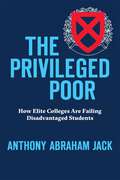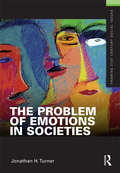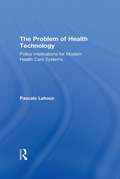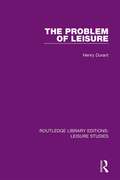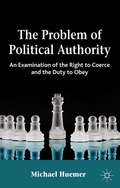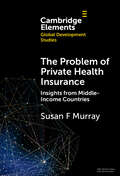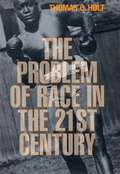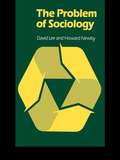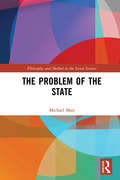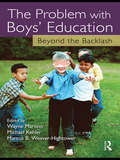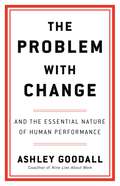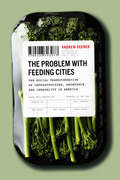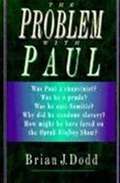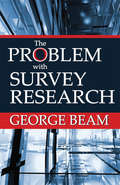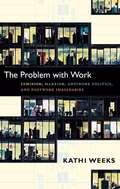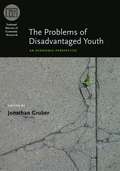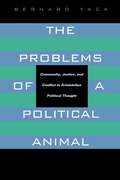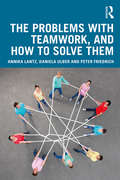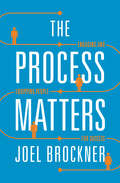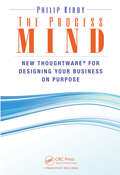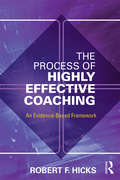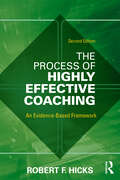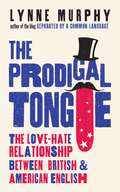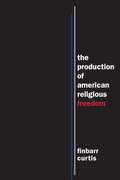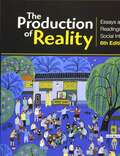- Table View
- List View
The Privileged Poor: How Elite Colleges Are Failing Disadvantaged Students
by Anthony Abraham JackGetting in is only half the battle. The struggles of less privileged students continue long after they’ve arrived on campus. Anthony Jack reveals how—and why—admission to elite schools does not mean acceptance for disadvantaged students, and he explains what schools can do differently to help the privileged poor thrive.
The Problem of Emotions in Societies (Framing 21st Century Social Issues)
by Jonathan TurnerLike any other valued resource, emotions are distributed unequally. Moreover, emotions are a generalized resource because they give people the confidence, or lack of confidence, to secure additional types of resources. Thus, this distribution of emotions roughly corresponds to the shares of others kinds of resources that members of various social classes possess. The level of positive and negative emotional energy evident among members of different social classes has large consequences for the viability of human societies. When a large majority of members in diverse social classes have reservoirs of positive emotional energy, these emotions work to legitimate macrostructures and to build people’s commitments to societies. When, however, significant numbers of persons in lower social classes, and at times in middle to upper social classes as well, reveal reservoirs of negative emotional energy, they are likely to de-legitimate key institutional systems and, under specifiable conditions, mobilize collective—often with violent outcomes. Thus, emotions are at the core of both integrative and disintegrative forces in societies, and when large reservoirs of negative emotional energy exist, they pose a problem for societies. The goal of this new, unique Series is to offer readable, teachable "thinking frames" on today’s social problems and social issues by leading scholars, all in short 60 page or shorter formats, and available for view on http://routledge.customgateway.com/routledge-social-issues.html For instructors teaching a wide range of courses in the social sciences, the Routledge Social Issues Collection now offers the best of both worlds: originally written short texts that provide "overviews" to important social issues as well as teachable excerpts from larger works previously published by Routledge and other presses.
The Problem of Health Technology: Policy Implications For Modern Health Care Systems
by Pascale LehouxHealth technology is a pivotal locus of change and controversy in health care systems, and The Problem of Health Technology offers a comprehensive and novel analysis of the topic. The book illuminates the scientific and policy arguments that are currently deployed in industrialized countries by addressing the perspectives of clinicians, health care managers, scholars, policymakers, patients, and industry. And by establishing a dialogue between two interdisciplinary fields--Health Technology Assessment and Science and Technology Studies--Pascale Lehoux argues for re-centering the debate around social and political questions rather than questions of affordability, thereby developing an alternative framework for thinking about the implications of health technology.
The Problem of Leisure (Routledge Library Editions: Leisure Studies)
by Henry DurantFirst published in 1938. This study examines various aspects of leisure in the early twentieth century. The author observes the differences in leisure between the various echelons of society, as well as the differences of leisure amongst children and adults. Durant also explores in depth several modes of leisure, including the cinema, sport, and gambling. This title will be of interest to students of history, sociology, and leisure studies.
The Problem of Political Authority
by Michael HuemerThe state is often ascribed a special sort of authority, one that obliges citizens to obey its commands and entitles the state to enforce those commands through threats of violence. This book argues that this notion is a moral illusion: no one has ever possessed that sort of authority.
The Problem of Private Health Insurance: Insights from Middle-Income Countries (Elements in Global Development Studies)
by Susan F. MurrayFinancial markets, actors, institutions and technologies are increasingly determining which kinds of services and 'welfare' are available, how these are narrated, and what comes to represent the 'common sense' in the policy world and in everyday life. This Element problematises the rationale and operation of one such financial technology, private health insurance, and the industry it inhabits. It offers a cross-disciplinary overview of the various drivers of these markets in middle-income countries and their appeal for development institutions and for governments. Using a range of illustrative case examples and drawing on critical scholarship it considers how new markets are pursued and how states are entangled with market development. It reflects on how the private health insurance sector in turn is shaping and segmenting health systems, and also our ideas about rights, fairness and responsibility.
The Problem of Race in the Twenty-First Century
by Thomas C. HoltThis brief book speaks powerfully to the question of how the circumstances of race and racism have changed in our time--and how these changes will affect our future. Foremost among the book's concerns are the contradictions and incoherence of a system that idealizes black celebrities in politics, popular culture, and sports even as it diminishes the average African-American citizen. The world of the assembly line, boxer Jack Johnson's career, and The Birth of a Nation come under Holt's scrutiny as he relates the malign progress of race and racism to the loss of industrial jobs and the rise of our modern consumer society. Understanding race as ideology, he describes the processes of consumerism and commodification that have transformed, but not necessarily improved, the place of black citizens in our society. As disturbing as it is enlightening, this timely work reveals the radical nature of change as it relates to race and its cultural phenomena. It offers conceptual tools and a new way to think and talk about racism as social reality.
The Problem of Sociology
by David Lee Howard NewbyFirst Published in 1983. Routledge is an imprint of Taylor & Francis, an informa company.
The Problem of the State (Philosophy and Method in the Social Sciences)
by Michael MairThe Problem of the State provides a new perspective on what the social and political sciences can contribute to understandings of the state and the ambivalent place it occupies in our collective affairs. Distinguishing two broad conceptual and methodological approaches to addressing the problem of how to study the state empirically rather than theoretically - the constitutionalist and constructionist positions – the author reviews the grounds and limits of both to reveal their common assumption: that it is up to the social and political sciences to define what the problem of the state is. Building on insights from Marx, Wittgenstein and Ethnomethodology, this book frees the study of the state from the limiting assumptions of common approaches and advocates a return of the problem to its proper environment, in social and political practice.
The Problem with Boys' Education: Beyond the Backlash
by Michael Kehler Marcus B. Weaver-Hightower Wayne MartinoThis book offers an illuminating analysis of the theories, politics, and realities of boys’ education around the world -- an insightful and often disturbing account of various educational systems’ successes and failings in fostering intellectual and social growth in male students. Examining original research on the impact of implementing boys’ education programs in schools, the book also discusses the role of male teachers in educating boys, strategies for aiding marginalized boys in the classroom, and the possibilities for gender reform in schools that begins at the level of pedagogy. Complete with case studies of various classrooms, school districts, and governmental policy programs, the detailed essays collected provide a look into education’s role in the development of masculinities, paying special attention to the ways in which these masculinities intersect with race, class, and sexuality to complicate the experience of boys within and outside of a classroom setting.
The Problem with Change: And the Essential Nature of Human Performance
by Ashley GoodallIf you&’ve had enough of the constant turbulence that defines corporate life today, you&’re not alone. Learn why change is bad for people and for business, and discover how to create the stability that we all need to thrive. For decades, &“disruption&” and &“change&” have been seen as essential to business growth and success. In this provocative and incisive book, leadership expert Ashley Goodall argues that what has become a sacred dogma is both wrong and harmful. Whether it&’s a merger or re-org or a new office layout, change has become the ultimate easy button for leaders, who pursue it with abandon, unleashing a torrent of disruption on employees. The result is what Goodall calls &“life in the blender&”—a perpetual cycle of upheaval, uncertainty, and unease. The problem with change, Goodall argues, is that a culture where everything from people to processes to strategic priorities are constantly in flux exerts a psychological toll that undermines motivation, productivity, and performance. And yet so accustomed are we to constant churn that we have become numb to its very real consequences. Drawing on two decades spent leading HR organizations at Deloitte and Cisco, Ashley Goodall reveals why change is not the same as improvement, and how, by prioritizing team cohesion (instead of reshuffling teams at will), by using real words (rather than corporate-speak), by sharing secrets (not mission statements), by fixing only the things that are truly broken (instead of moving fast and breaking everything in sight, and more, leaders at every level can create the stability that people need to thrive.
The Problem with Feeding Cities: The Social Transformation of Infrastructure, Abundance, and Inequality in America
by Andrew DeenerFor most people, grocery shopping is a mundane activity. Few stop to think about the massive, global infrastructure that makes it possible to buy Chilean grapes in a Philadelphia supermarket in the middle of winter. Yet every piece of food represents an interlocking system of agriculture, manufacturing, shipping, logistics, retailing, and nonprofits that controls what we eat—or don’t.The Problem with Feeding Cities is a sociological and historical examination of how this remarkable network of abundance and convenience came into being over the last century. It looks at how the US food system transformed from feeding communities to feeding the entire nation, and it reveals how a process that was once about fulfilling basic needs became focused on satisfying profit margins. It is also a story of how this system fails to feed people, especially in the creation of food deserts. Andrew Deener shows that problems with food access are the result of infrastructural failings stemming from how markets and cities were developed, how distribution systems were built, and how organizations coordinate the quality and movement of food. He profiles hundreds of people connected through the food chain, from farmers, wholesalers, and supermarket executives, to global shippers, logistics experts, and cold-storage operators, to food bank employees and public health advocates. It is a book that will change the way we see our grocery store trips and will encourage us all to rethink the way we eat in this country.
The Problem with Paul
by Brian J. DoddWas Paul a chauvinist? Was he a prude? Was he anti-Semitic? Why did Paul condone slavery? How might he have fared on the Oprah Winfrey Show? People outside the church have often found Paul hard to stomach. His views on women, sex and marriage, his failure to attack the institution of slavery, and his verbal attacks on his opponents have all come under fire. Regrettably, Paul hasn't always fared that much better among believers. Like the apostle Peter, many wonder what to make of Paul and his confusing, controversial--and sometimes apparently contradictory--teachings. To put it simply, Paul just isn't politically correct. Brian Dodd offers a fresh look at the perpetually enigmatic and misunderstood Paul. Combining pastoral insight and scholarly rigor, he helps us bridge the gap between Paul's ancient world and our postmodern setting. Here is much-needed perspective for making sense of Paul--the man and his message.
The Problem with Survey Research
by George BeamThe Problem with Survey Research makes a case against survey research as a primary source of reliable information. George Beam argues that all survey research instruments, all types of asking-including polls, face-to-face interviews, and focus groups-produce unreliable and potentially inaccurate results. Because those who rely on survey research only see answers to questions, it is impossible for them, or anyone else, to evaluate the results. They cannot know if the answers correspond to respondents' actual behaviors (objective phenomena) or to their true beliefs and opinions (subjective phenomena). Reliable information can only be acquired by observation, experimentation, multiple sources of data, formal model building and testing, document analysis, and comparison. In fifteen chapters divided into six parts-Ubiquity of Survey Research, The Problem, Asking Instruments, Asking Settings, Askers, and Proper Methods and Research Designs-The Problem with Survey Research demonstrates how asking instruments, settings in which asking and answering take place, and survey researchers themselves skew results and thereby make answers unreliable. The last two chapters and appendices examine observation, other methods of data collection and research designs that may produce accurate or correct information, and shows how reliance on survey research can be overcome, and must be.
The Problem with Work: Feminism, Marxism, Antiwork Politics, and Postwork Imaginaries
by Kathi WeeksIn The Problem with Work, Kathi Weeks boldly challenges the presupposition that work, or waged labor, is inherently a social and political good. While progressive political movements, including the Marxist and feminist movements, have fought for equal pay, better work conditions, and the recognition of unpaid work as a valued form of labor, even they have tended to accept work as a naturalized or inevitable activity. Weeks argues that in taking work as a given, we have "depoliticized" it, or removed it from the realm of political critique. Employment is now largely privatized, and work-based activism in the United States has atrophied. We have accepted waged work as the primary mechanism for income distribution, as an ethical obligation, and as a means of defining ourselves and others as social and political subjects. Taking up Marxist and feminist critiques, Weeks proposes a postwork society that would allow people to be productive and creative rather than relentlessly bound to the employment relation. Work, she contends, is a legitimate, even crucial, subject for political theory.
The Problems of Disadvantaged Youth: An Economic Perspective
by Jonathan GruberOne of the most important public policy issues in the United States is how to improve the life prospects of disadvantaged youth who, in their formative years, face low-quality school systems, poor access to health care, and high-crime environments. The Problems of Disadvantaged Youth includes a broad range of research examining various aspects of disadvantage, and ways of increasing the ability of low-income youths to improve their circumstances later in life. Taking an empirical economics perspective, the nine essays in this volume assess the causal impacts of disadvantage on youth outcomes, and how policy interventions can alleviate those impacts. Each chapter develops a framework to describe the relationship between youths and later life outcomes, addressing such factors as educational opportunity, health, neighborhood crime rates, and employment. This vital book documents the serious short- and long-term negative consequences of childhood disadvantage and provides nuanced evidence of the impact of public policy designed to help needy children.
The Problems of a Political Animal: Community, Justice, and Conflict in Aristotelian Political Thought
by Bernard YackA bold new interpretation of Aristotelian thought is central to Bernard Yack's provocative new book. He shows that for Aristotle, community is a conflict-ridden fact of everyday life, as well as an ideal of social harmony and integration. From political justice and the rule of law to class struggle and moral conflict, Yack maintains that Aristotle intended to explain the conditions of everyday political life, not just, as most commentators assume, to represent the hypothetical achievements of an idealistic "best regime."By showing how Aristotelian ideas can provide new insight into our own political life, Yack makes a valuable contribution to contemporary discourse and debate. His work will excite interest among a wide range of social, moral, and political theorists.
The Problems with Teamwork, and How to Solve Them
by Annika Lantz Friedrich Daniela Ulber Peter FriedrichThis book offers practical, evidence-based solutions to help professionals implement and support effective teamwork. Lantz, Ulber and Friedrich draw on their considerable professional experience to present common problems in team-based organizations, what empirical research tells us the causes are and which solutions are more effective in overcoming team-based obstacles. In The Problems with Teamwork, and How to Solve Them, nine common problems are identified, ranging from lack of leadership and adaptability to conflict and cohesiveness, accompanied by clear instructions on how to approach and resolve the individual issues. Detailed case studies are presented throughout the book, demonstrating how theory can be applied to real-life situations to produce optimal results for both the team and the larger organisation. By combining theory and practice, and using state-of-the-art research, the book constructs a cognitive map for identifying problem causes and effect, and step-by-step instructions on how to solve problems. This is essential reading for anyone working in team-based organizations, as well as students and academics in related areas such as organizational psychology and organizational behaviour.
The Process Matters
by Joel BrocknerWe do business in a results-oriented world. Our focus on growth is laudable for its clarity, but one of its downsides is that firms can lose sight of the process: how business gets done and the individuals or employees through whom results are achieved. This leads to compromised decisions and unethical behavior. It is not just what we accomplish that matters but also how we accomplish it. In The Process Matters, Joel Brockner shows that managers have to do more than just meet targets and goals. They have to reach those ends in the right ways--with input, consistency, and accountability--if they want to effectively lead and manage in their organizations. Brockner discusses what goes into the right process, how it leads to better outcomes, why it is easier said than done, and how to overcome obstacles along the way. Brockner demonstrates that a high-quality process often costs little and may not even require a great deal of time. In light of these facts, he considers the puzzling question of why good business practice doesn't happen more often. Brockner draws from various real-life workplace examples--from Jay Leno's departure (twice) from his TV show, to the improvement of shooting accuracy in the U.S. Navy, to the surprising results of layoffs in Canada. He also factors in a wide swath of studies to examine such issues as the importance of perceived fairness in the process, the management of organizational change, and the encouragement of a strong sense of self in those involved in decisions--in short, the ways that managers can bring out the best in their people. Relevant to anyone who is in a managerial position--from the CEO on down--The Process Matters proves that seemingly simple differences in process can go a long way.
The Process Mind: New Thoughtware - for Designing Your Business on Purpose
by Philip KirbyWhat if you could double your productivity without additional capital investment? What if you could outperform your competition by changing the way you think? What if you could be fast, flexible, and low cost?In The Process Mind, Philip Kirby not only opens your mind to these possibilities but shows you how it is done. The book emphatically makes t
The Process of Highly Effective Coaching: An Evidence-Based Framework
by Robert F. HicksThe Process of Highly Effective Coaching offers a unique blend of theory and practical methods for conducting effective coaching conversations. It provides an umbrella under which all of the major conceptual models for helping people change can not only coexist but work together. In addition to using this integrative approach, The Process of Highly Effective Coaching presents a framework for conducting coaching conversations and for relating the coaching process to the coaching competencies defined by the International Coach Federation, the largest coach-credentialing organization in the world.
The Process of Highly Effective Coaching: An Evidence-Based Framework
by Robert F. HicksThe Process of Highly Effective Coaching, 2nd edition, offers a unique blend of theory and practical methods for conducting effective coaching conversations. The book presents a framework for navigating a conversation’s dynamic flow, enabling the practitioner to assimilate information and exhibit the agility of master-level coaches. Additionally, the framework synergistically incorporates the major evidence-based models for achieving client-driven outcomes. This second edition contains fresh content that ties the Foursquare Coaching Framework to the latest information from neuropsychology, leadership, and organizational change.
The Prodigal Tongue: The Love–Hate Relationship Between British and American English
by Lynne Murphy&‘The first and perhaps only book on the relative merits of American and British English that is dominated by facts and analysis rather than nationalistic prejudice. For all its scholarship, this is also a funny and rollicking read.&’ The Economist, Books of the YearOnly an American would call autumn fall or refer to a perfectly good pavement as a sidewalk… Not so, says Lynne Murphy. The English invented sidewalk in the seventeenth century and in 1693 John Dryden wrote the line, &‘Or how last fall he raised the weekly bills.&’ Perhaps we don&’t know our own language quite as well as we thought. Murphy, an American linguist in Britain, dissects the myths surrounding British and American English in a laugh-out-loud exploration of how language works and where it&’s going.
The Production of American Religious Freedom: The Production of American Religious Freedom (North American Religions)
by Finbarr CurtisAmericans love religious freedom. Few agree, however, about what they mean by either “religion” or “freedom.” Rather than resolve these debates, Finbarr Curtis argues that there is no such thing as religious freedom. Lacking any consistent content, religious freedom is a shifting and malleable rhetoric employed for a variety of purposes. While Americans often think of freedom as the right to be left alone, the free exercise of religion works to produce, challenge, distribute, and regulate different forms of social power.The book traces shifts in the notion of religious freedom in America from The Second Great Awakening, to the fiction of Louisa May Alcott and the films of D.W. Griffith, through William Jennings Bryan and the Scopes Trial, and up to debates over the Tea Party to illuminate how Protestants have imagined individual and national forms of identity. A chapter on Al Smith considers how the first Catholic presidential nominee of a major party challenged Protestant views about the separation of church and state. Moving later in the twentieth century, the book analyzes Malcolm X’s more sweeping rejection of Christian freedom in favor of radical forms of revolutionary change. The final chapters examine how contemporary controversies over intelligent design and the claims of corporations to exercise religion are at the forefront of efforts to shift regulatory power away from the state and toward private institutions like families, churches, and corporations. The volume argues that religious freedom is produced within competing visions of governance in a self-governing nation.
The Production of Reality: Essays and Readings on Social Interaction
by Jodi O 8242 BrienA one-of-a-kind social psychology book that inspires readers to be awake in the world. In this new, Sixth Edition, Jodi O’Brien continues to explore the historical development of the concept of the self, and help readers see the patterns we use to make sense of our own lives. The book introduces the major theories, concepts, and perspectives of contemporary social psychology in a uniquely engaging manner. Compelling original essays that provide an overarching framework are followed by a wide-ranging set of readings. By grounding social psychology in student experiences and explaining theories through stories and narratives, this one-of-a-kind book helps students understand the forces that shape their feelings, thoughts, and actions. Contributor to the SAGE Teaching Innovations & Professional Development Award Find out more at www.sagepub.com/sociologyaward
